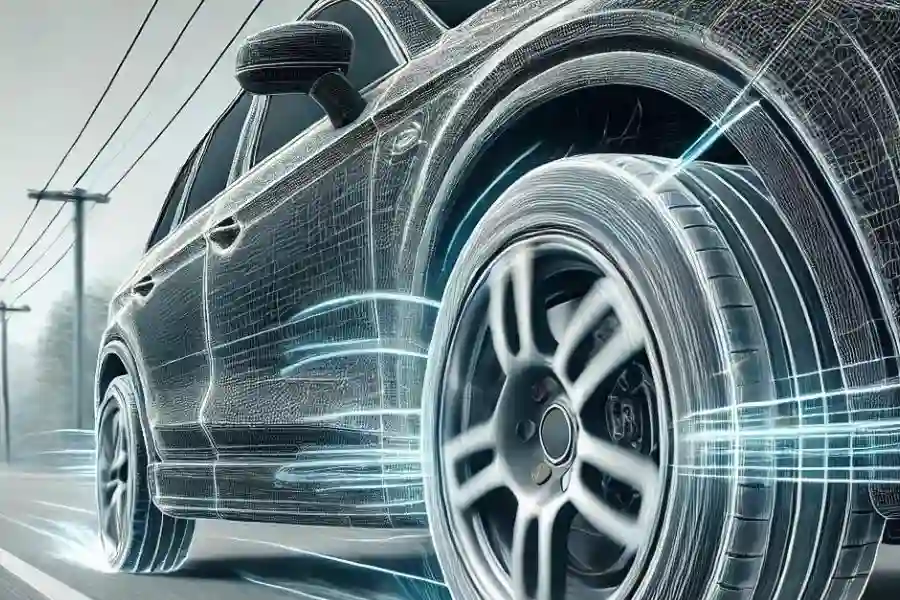Have you ever partook your car shaking when braking, never sure if you can make each stop without disturbing the whole car? If so, you’re not alone. Thing issue is uncomfortable and may be a symptom of underlying issues with your car.
Knowing why this happens and how to fix it is vital to maintaining your automobile operating smoothly, not to say being safe out on the road. So this article will cover the main cause of vibration while braking your car, from worn brake pads to warped rotors, and also how you can solve them as well.
Key Takeaways:
- Common causes include warped rotors, misaligned wheels, worn brake pads, and suspension issues.
- Ignoring these signs can lead to further damage or even accidents.
- Proper vehicle maintenance is key to preventing this problem from escalating.
Warped Brake Rotors: A Leading Cause of Vibrations
Warped Brake Rotors Rotors are a vital part of the braking system, planned to give brake pads a flat and smooth consistency for them to press against when you step on the brakes. These rotors can get warped over time by the constant heat and retraction experienced in stop-and-go traffic or when driving downhill!
Why Do Brake Rotors Warp?
The main reason rotors warp is due to heat soak. The friction that occurs when the brakes are applied will create heat, leading to rotor expansion. For instance, if it is done repeatedly, the rotors may become warped and uneven. Warped rotors also may show with:
- Pulsation or vibration in the brake pedal
- The steering wheel shakes during braking
- Uneven brake wear
Warped Rotors: Resurfacable or Replaceable
Rotor warping can be repaired, some times the rotors are too far gone. If the rotor wear is only slight, a mechanic potentially can machine them down to return the smoothness. If they are severely damaged, though, one of them might be too far gone to be saved and your dentist advises that replacement is the best to avoid further trouble.
Worn Brake Pads: A Silent but Significant Problem
One of the biggest causes your car shakes when braking is likely down to worn brake pads. The uneven contact between the brake pads, which are designed to wear down over time, and the rotors that occur when they become too thin is a possible wear-related cause of vibration.
Worn Brake Pads
- Squealing: This can mean the metal of your worn-down pads is grinding against your rotors.
- The brake shuddering, especially under high-speed braking
- The pedal is “mushy,” pedal works to ground but not fully.
This Brings Us To Our First Solution – Worn Brake Pads
While this is a necessity for smooth stopping, it is also an important safety measure. Fresh brake pads allow for the right level of contact with rotors, ensuring that no harm befalls your braking. We recommend immediate service on your brake pads to prevent other, more expensive repairs down the line.
Wheel Alignment Issues: The Silent Cause of Shaking
Although not something that is generally high on everyone’s list of priorities, wheel alignment can have a significant impact on the quality of drive your car has. Misaligned wheels can wear brake pads unevenly, which means they won’t press down at the same pressure every time you hit the brakes—hence all that shuddering.
Some signs indicating that there is a problem with alignment include:
- Uneven tire wear.
- Car trying to pull to one side, even on a plain road.
- Vibrations are felt through the steering wheel or pedals.
Align Your Wheels
Unaligned wheels are the most common shaking issue with every car in the world. Nearly all technicians suggest having your alignment checked every 6,000 to 10,000 miles, or right after drilling a large pothole in the road or curb.
Suspension Problems: When the Shakes Go Beyond Braking
The suspension takes up all the stress and jerks on your car, ensuring a smooth and comfortable ride even on bumpy roads. But as components like struts or shocks wear out, vibrations become more pronounced, especially when braking. When you apply the brakes, the weight of your car naturally shifts to its front end.
If suspension parts are worn out, they can’t manage this weight transfer properly, causing shaking or wobbling, particularly during hard braking or quick stops. This can also lead to uneven tire wear and reduced vehicle handling over time.
Suspension Woes Solution
Most suspension repairs involve replacing worn-out shocks or struts, which restore your vehicle’s ability to absorb impacts and stabilize. Regular check-ups for your suspension components help prevent major issues, ensuring your car continues to handle and brake smoothly. Monitoring your suspension not only improves your ride but also boosts safety and extends the life of related parts like tires and brakes.
Tire Problems: The Overlooked Culprit
While they tend to be forgotten about from time to time, tires can play a large role in what causes your car to shake when you brake. Unequal tire tread or older, worn tires can also lead to vibrations, along with an unevenly inflated tire.
Common Tire-Related Issues
- Worn or deflated tread
- Sudden braking causes flat spots
- Tires out of balance
Resolving Tire-Related Problems
Keeping your tires healthy is one of the easiest ways to ensure your car doesn’t shake when you brake. Vibrations are significantly decreased when you rotate your tires consistently. Be sure to check for underinflation and inspect for tire wear regularly to catch these issues early.
Brake Caliper Issues: Rare but Significant
More unlikely, though not often, a stuck brake caliper usually makes your car shake when braking. When the calipers get jammed, they fail to clamp down on the rotors uniformly, making pressure distribution uneven and eventually causing vibrations.
Symptoms of a Seized Brake Caliper
- A car pulls in one direction while braking
- Heat or burning smell near a wheel
- The brake pedal feels “spongy”
Sticky Brake Caliper Repair
Whether just supplying a brake caliper for installation or having it checked by a mechanic, you will know exactly what has to be done. Replace or repair the caliper before it damages more of your braking system, ensuring smooth braking.
Brake Fluid and Hydraulic Issues: Rare but Possible
In the end, even problems with your car’s brake fluid or hydraulic system can be responsible for shaking during braking. Vibration occurs when the pressure applied changes and becomes uneven due to contamination of the brake fluid or a leak in the hydraulic lines.
Symptoms Observed
- Spongy brake pedal
- Weak brake pedal feel
- Leaking fluid under your car
Fix Hydraulic Issues
Bleeding the brake lines or flushing and refilling the brake fluid may fix this problem. Otherwise, you may need to replace parts of your hydraulic system to restore proper brake function.
Conclusion
If the whole driving experience is shaking with every brake, you should never ignore it. It is more than an annoyance—it can indicate that your brake rotors are warped, your brake pads are worn out, or you have a wonky suspension. It’s crucial to solve these problems quickly to avoid vehicle issues and ensure safety on the road.
Are you experiencing shaking in your car when you step on the brake pedal? Or do you suspect a cause described above? Make sure to get it diagnosed by a professional to prevent further problems. Check out our full stack of car maintenance and safety guides for more tips to keep your ride rolling.

